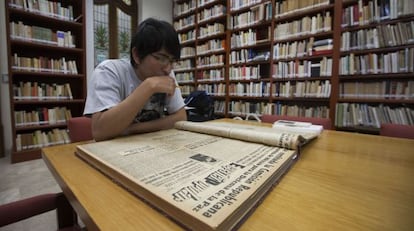Spanish exiles’ historic cultural center in Mexico City faces closure
The Ateneo Español was founded after Civil War by poet León Felipe and other intellectuals


The Ateneo Español cultural center in Mexico City – founded by Republican exiles such as poet León Felipe, filmmaker Luis Buñuel and composer Rodolfo Halffter to promote Spanish culture and science after the Civil War – is on the verge of financial collapse.
Reduction in official financing and the aging of its members have placed this unique archive – which includes a 21,000-volume library and is essential to understanding the painful story of Spain’s Civil War exiles in Mexico – in danger of disappearing.
From its very beginning, the Ateneo was a hive of cultural activity
“We are between a rock and a hard place; the institution is at risk and we need help,” says Ateneo president Carmen Tagüeña.
During the rainy July of 1940, poet Felipe invited a group of fellow exiles to help organize the Ateneo Español in Mexico City.
Spain’s Civil War had ended the year before and the Mexican capital, which at that time had only a million inhabitants, became home to thousands of refugees fleeing the Francisco Franco dictatorship.
They had left behind a Europe now in all-out conflict, where Hitler’s advancing barbarism seemed unstoppable and Franco had begun savagely punishing those he had defeated in the Civil War.
During those dark hours, Mexico was seen as a land of hope. President Lázaro Cardenas opened the doors to Spanish exiles. The Institutional Revolutionary Party (PRI) leader established a hard-line Mexican foreign policy toward Spain, which was kept intact until March 28, 1978, when Spanish democracy was restored and diplomatic relations were re-established.

From its very beginning, with the help of intellectuals such as Felipe, Buñuel, Halffter, Ramón Gaya, Margarita Nelken, Tomás Bilbao, Joaquín Diez-Canedo and others, the Ateneo was a hive of cultural activity that only increased during Spain’s transition to democracy and continued into the present.
Its library of 21,584 volumes attracts more than 200 university researchers each year, while its rooms, located in a historic building in the headquarters of Spain’s UNED distance-learning university, regularly host lectures, screenings, book presentations and debates.
“Migration and exiles continue to form part of its focus,” explains Tagüeña, the daughter of a Republican lieutenant colonel. “A history lesson that must not be forgotten is preserved here.”
But now the institution is at risk of disappearing. Funds are at a minimum and may only suffice to cover finances until January.
“The Spanish Embassy supports us, but it’s not enough. By February and March we will have liquidity problems,” says Tagüeña.
There are multiple reasons for the current dire situation. Seventy-six years after the end of the Civil War, membership has declined, and the center’s once-strong bond with the grandchildren and the great-grandchildren of exiles has diminished. There are only 140 active members, some of whom are unable to pay the modest annual fee of 1,000 pesos (€55).
External sources have also dried up. Grants for specific projects handed out by Spain’s AECID international development agency were reduced during the Spanish economic crisis. However, the agency still maintains a commitment to continue collaborating with the Ateneo and last week granted it €5,000.
And although the Spanish Embassy and Labor Ministry provide additional amounts to help cover the center’s administrative expenses, the money does not go far in paying staff and maintenance costs (€50,000), even though managers do not collect salaries.
“The Ateneo has bibliographic and testimonial sources of great value,” says Enrique Cortés de Abajo, education attaché at the Spanish Embassy. “And now it needs greater organizational muscle to promote its assets.”
We need to maintain an institution that represents the diversity of those who were forced into exile” Ateneo director Carmen Tagüeña
With time running out, the Ateneo has decided to launch a campaign to seek support and has begun to involve young people and look for partners and benefactors.
“The importance of the Ateneo lies not just in collecting relics, but in maintaining an institution that represents the diversity of those who were forced into exile; it is a bridge between Spain and Mexico, and a cultural asset for both countries,” says Tagüeña.
Aware of these problems, Spanish secretary of state for culture, José María Lassalle, said this week that the government was interested in helping and contributing “to the extent that a very important part of the historical footprint of Spanish exile in Mexico is preserved in the files and in that space.”
He said he was willing to meet with the director, although he pointed out “the difficulties of promoting cultural policy abroad” as it is also reliant on the support of the Foreign Ministry, “which has not raised this issue.”
English version by Martin Delfín.
Tu suscripción se está usando en otro dispositivo
¿Quieres añadir otro usuario a tu suscripción?
Si continúas leyendo en este dispositivo, no se podrá leer en el otro.
FlechaTu suscripción se está usando en otro dispositivo y solo puedes acceder a EL PAÍS desde un dispositivo a la vez.
Si quieres compartir tu cuenta, cambia tu suscripción a la modalidad Premium, así podrás añadir otro usuario. Cada uno accederá con su propia cuenta de email, lo que os permitirá personalizar vuestra experiencia en EL PAÍS.
¿Tienes una suscripción de empresa? Accede aquí para contratar más cuentas.
En el caso de no saber quién está usando tu cuenta, te recomendamos cambiar tu contraseña aquí.
Si decides continuar compartiendo tu cuenta, este mensaje se mostrará en tu dispositivo y en el de la otra persona que está usando tu cuenta de forma indefinida, afectando a tu experiencia de lectura. Puedes consultar aquí los términos y condiciones de la suscripción digital.








































